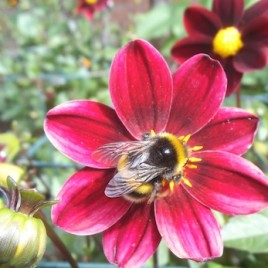
A bumblebee (Bombus terrestris) worker foraging on a Dahlia flower. A new analysis suggests that neonicotinoids have an impact on the choice of flowers bees forage from, as well as their foraging efficiency. (Photo credit: Richard Gill)
A new analysis confirms that exposure to pesticides – including one in the neonicotinoid (neonic) class – has a negative impact on bees’ foraging ability.
The study used radio-frequency identification (RFID) tags to track 259 bees from 40 colonies over 4 weeks. Bees exposed to the neonic pesticide either by itself or mixed with another pesticide brought home less pollen as they got older, whereas untreated bees brought home more pollen as they got older, reflecting increased foraging experience. Neonic exposed workers also collected pollen from different flower sources than untreated bees.
These findings suggest that neonics at field-relevant concentrations influence the flower choices made by bees and interfere with bees’ ability to learn and remember how to extract pollen from flowers.
Original research paper published in the journal Functional Ecology on July 8, 2014.
Names and affiliations of selected authors


